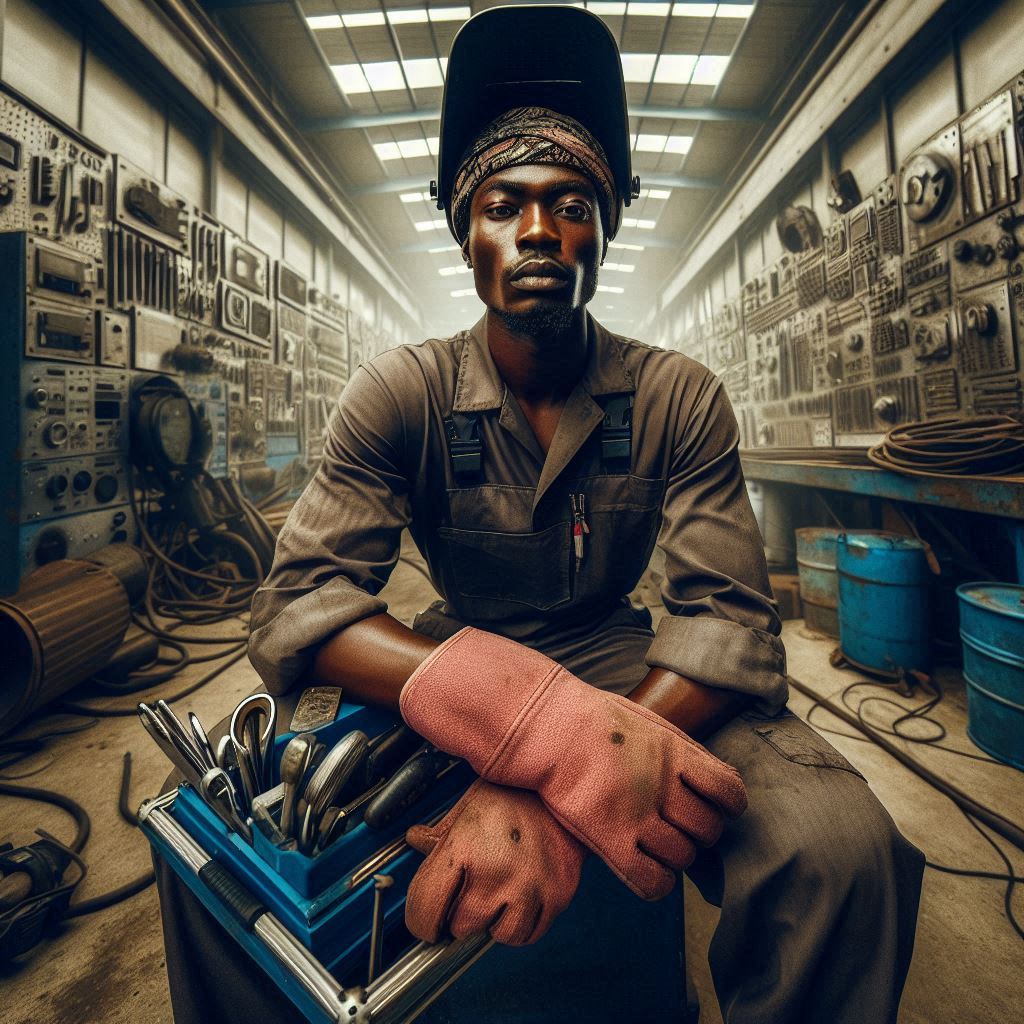Introduction
Welding safety standards play a critical role in safeguarding workers and enhancing operational efficiency in industrial settings across Nigeria.
These standards are paramount due to the inherent risks associated with welding activities, making adherence crucial for ensuring workplace safety.
Importance of Welding Safety Standards
In Nigeria’s industrial landscape, welding operations are ubiquitous, from construction sites to manufacturing plants. The significance of robust safety standards cannot be overstated.
They not only protect workers from immediate hazards but also mitigate long-term health risks associated with exposure to welding fumes and ultraviolet radiation.
Current State of Regulations
Currently, Nigeria follows a regulatory framework aimed at enforcing safety measures in welding. However, challenges persist in uniform enforcement and compliance monitoring across all sectors.
Variability in adherence exists among different regions and industries, highlighting the need for standardized, nation-wide protocols.
Common Risks and Hazards
Welding activities involve multiple risks, including electric shock, burns from molten metal, and inhalation of toxic fumes.
Additionally, workers face physical hazards such as eye injuries from flying particles and noise-induced hearing loss due to the loud processes involved.
Electric Shock and Burns
Electric shock remains a significant concern due to the high voltage currents involved in welding equipment. Improper grounding or damaged insulation can lead to severe injuries or fatalities.
Burns from hot metals and flames are equally prevalent, necessitating the use of appropriate personal protective equipment (PPE) and adherence to safe work practices.
Health Risks from Fumes and Radiation
Exposure to welding fumes containing toxic metals like chromium, nickel, and manganese poses long-term health risks such as respiratory diseases and cancer.
Ultraviolet radiation emitted during welding operations can cause skin burns and increase the risk of eye damage without adequate protective measures such as welding helmets with UV filters.
Physical Hazards and Safety Measures
In addition to electric and health hazards, physical risks include eye injuries from metal fragments and debris. Proper eye protection, such as safety glasses and welding helmets with impact-resistant shields, is essential.
Noise levels generated during welding also necessitate hearing protection to prevent noise-induced hearing loss.
Generally, welding safety standards in Nigeria are indispensable for protecting workers and promoting productivity in industrial sectors.
While existing regulations provide a foundation, there is a critical need for enhanced enforcement and standardization across the country.
Addressing common risks through comprehensive safety measures ensures a safer working environment and reduces the incidence of occupational injuries and illnesses related to welding activities.
By prioritizing safety protocols, stakeholders can contribute to a sustainable workplace culture where health, safety, and operational efficiency go hand in hand.
As Nigeria continues to develop industrially, ensuring robust welding safety standards will be integral to fostering a safe and productive workforce across all sectors.
Nigerian Welding Safety Regulations and Standards
When it comes to welding safety, Nigeria has specific regulations in place to ensure the well-being of workers and the general public.
Let’s take a closer look at the existing welding safety regulations in Nigeria and compare them to international standards such as ISO and AWS.
Detailed Examination of Existing Welding Safety Regulations in Nigeria
- Nigeria’s welding safety regulations are primarily governed by the Factories Act, which outlines requirements for safe working conditions in industrial settings.
- There are also specific guidelines provided by the Nigerian Society of Engineers (NSE) and the Nigerian Welding Society (NWS) to ensure compliance with best practices.
- Key aspects covered by these regulations include proper training for welders, use of personal protective equipment (PPE), ventilation, and fire prevention measures.
- Welding equipment must be regularly inspected and maintained to ensure safe operation, and any faulty equipment should be immediately replaced or repaired.
- Proper storage and handling of welding gases and materials are also emphasized to prevent accidents and ensure a secure working environment.
- These regulations are essential for promoting a culture of safety in the welding industry and reducing the risk of workplace accidents and injuries.
Comparison with International Welding Safety Standards
- ISO standards, such as ISO 3834 for quality requirements in welding, and AWS standards, like AWS D1.1 for structural welding, are recognized globally.
- Nigeria can benefit from aligning its welding safety regulations with these international standards to enhance the quality and safety of welding practices in the country.
- By adopting best practices from ISO and AWS, Nigeria can improve the overall efficiency and effectiveness of its welding industry while ensuring the well-being of workers.
Enforcement Agencies Responsible for Monitoring Compliance with Welding Safety Standards
- In Nigeria, the Federal Ministry of Labour and Employment, through its Factory Inspectorate Department, is responsible for enforcing welding safety regulations.
- The Department of Occupational Safety and Health (DOSH) also plays a crucial role in monitoring and inspecting workplaces to ensure compliance with safety standards.
- Collaboration with professional bodies such as the Nigerian Welding Society is essential to promote awareness and adherence to welding safety regulations.
- Regular audits and inspections by these enforcement agencies help identify areas of improvement and ensure that workplaces maintain high safety standards.
- Penalties and sanctions are imposed on organizations that fail to comply with welding safety regulations, underscoring the importance of strict enforcement measures.
- Overall, a combined effort between government agencies, professional bodies, and industry stakeholders is necessary to uphold welding safety standards in Nigeria.
By continuously reviewing and updating welding safety regulations in line with international standards, Nigeria can enhance workplace safety, protect workers, and promote sustainable growth in the welding industry.
Read: Essential Tools for Telecom Engineers in Nigeria
Key Components of Welding Safety Standards in Nigeria
Explanation of the essential elements of welding safety standards in Nigeria
Welding safety standards in Nigeria encompass a range of key components that are crucial to ensuring the safety of workers and the surrounding environment.
These standards are put in place to minimize risks and hazards associated with welding activities.
Training Requirements
- All welders in Nigeria are required to undergo comprehensive training to ensure they have the necessary skills and knowledge to safely operate welding equipment.
- Training may cover topics such as proper welding techniques, identification of hazards, and emergency response procedures.
- Regular training and ongoing education are essential to keep welders up-to-date on the latest safety protocols and industry best practices.
Personal Protective Equipment (PPE)
- Welders in Nigeria must wear appropriate PPE, such as helmets, goggles, gloves, and protective clothing, to protect themselves from heat, sparks, and fumes.
- Properly fitting PPE is essential to ensure optimal protection for the welder and minimize the risk of injuries.
- Regular inspection and replacement of PPE are essential to ensure that it remains effective in providing protection.
Ventilation Systems
- Effective ventilation systems are necessary to remove fumes, gases, and smoke generated during welding processes to prevent inhalation of harmful substances.
- Proper ventilation helps maintain air quality in the workspace and reduces the risk of respiratory issues among welders.
- Regular maintenance and inspection of ventilation systems are crucial to ensure their continued effectiveness in controlling air pollutants.
Emergency Procedures
- Clear and concise emergency procedures must be established and communicated to all workers in case of accidents, fires, or other unforeseen incidents.
- Training on emergency response protocols, including evacuation procedures and first aid techniques, should be provided to all personnel.
- Regular drills and simulations of emergency scenarios help prepare workers to respond effectively in times of crisis.
Importance of Proper Maintenance of Welding Equipment
- Maintaining welding equipment in good working condition is essential to ensuring the safety and efficiency of welding operations in Nigeria.
- Regular inspection, cleaning, and servicing of welding equipment help prevent malfunctions and potential hazards during use.
- Well-maintained equipment also contributes to the quality of welds and prolongs the lifespan of the machinery, reducing the risk of accidents.
In a nutshell, adherence to welding safety standards in Nigeria is critical to protecting the health and well-being of welders and ensuring the safe operation of welding activities.
By incorporating training requirements, personal protective equipment, ventilation systems, emergency procedures, and proper maintenance practices, companies can create a safer work environment and minimize the risks associated with welding operations.
Read: Women in Nigerian Telecommunication Engineering
Challenges and Compliance Issues in Welding Safety Standards
In Nigeria, adhering to welding safety standards faces significant challenges. Lack of awareness among welders and employers hampers compliance.
Inadequate training programs contribute to ignorance about safety protocols. Limited availability of safety equipment and gear impedes adherence.
Factors Contributing to Non-Compliance
Several factors contribute to non-compliance with welding safety regulations. Economic pressures often prioritize cost-cutting over safety investments.
Insufficient regulatory enforcement leads to lax attitudes towards safety measures. Cultural attitudes that prioritize productivity over safety exacerbate the issue.
Consequences of Failing to Meet Standards
Failing to meet welding safety standards can result in severe consequences. Increased risk of accidents and injuries jeopardizes worker well-being.
Legal ramifications include fines and potential business closure for non-compliant firms. Reputation damage due to safety incidents affects business credibility and trust.
In Nigeria, the challenges in upholding welding safety standards are multifaceted and pervasive. Awareness among welders and employers regarding safety protocols remains alarmingly low.
Without adequate training programs, many workers are unaware of the essential safety measures necessary for their protection.
Economic considerations often overshadow safety concerns in the welding industry.
Companies, under financial pressure, may prioritize reducing costs over investing in proper safety equipment and training.
This cost-cutting approach, while seemingly beneficial in the short term, exposes workers to unnecessary risks and compromises their safety.
Furthermore, the enforcement of welding safety regulations in Nigeria is inconsistent.
This lax enforcement perpetuates a cycle where safety takes a back seat to productivity and profitability.
The consequences of failing to meet welding safety standards can be severe and far-reaching.
The foremost concern is the increased risk of workplace accidents and injuries.
Without proper safety measures in place, workers are vulnerable to burns, electrical shocks, and exposure to hazardous chemicals, leading to immediate harm and long-term health issues.
From a legal perspective, non-compliance can result in substantial penalties. Nigerian regulations mandate fines and sanctions for businesses that fail to adhere to safety standards.
In review, the challenges and compliance issues surrounding welding safety standards in Nigeria underscore the need for comprehensive reforms.
Enhanced awareness, stringent enforcement, and a cultural shift towards prioritizing safety are essential steps towards creating a safer working environment for welders across the country.
By addressing these issues proactively, Nigeria can improve workplace safety outcomes and protect the well-being of its workforce.
Read: Role of ICT in Nigerian Telecommunication Engineering

Delve into the Subject: Notable Nigerian Computer Engineers and Their Work
Best Practices for Welding Safety in Nigeria
Tips and recommendations for improving welding safety practices in Nigerian workplaces
Welding is a crucial process in many industries in Nigeria, but it comes with its own set of risks and hazards.
To ensure the safety of workers and prevent accidents, here are some best practices that can be implemented:
Regular safety audits
Regular safety audits are essential to identify potential hazards and risks in the welding process.
By conducting these audits on a regular basis, employers can ensure that safety measures are up to date and effective.
Risk assessments
Before starting any welding job, it is important to conduct a thorough risk assessment to identify potential hazards and risks. By understanding the risks involved, workers can take appropriate safety measures to prevent accidents.
Employee training
Proper training is essential for all workers involved in the welding process. Training should cover safety procedures, the proper use of equipment, and emergency response protocols. Regular training sessions can help reinforce safety practices and prevent accidents.
Case studies highlighting successful implementation of welding safety standards in Nigerian industries
Implementing welding safety standards in Nigerian industries has proven to be effective in reducing accidents and ensuring the well-being of workers.
Here are some case studies that highlight successful implementation of welding safety standards:
- Nigerian Manufacturing Corporation, a manufacturing plant in Lagos, implemented regular safety audits and employee training programs. As a result, they saw a significant decrease in welding-related accidents.
- Nigerian Oilfields Limited, an oil and gas company in Port Harcourt, conducted thorough risk assessments before every welding job. This proactive approach helped prevent accidents and injuries among workers.
- Abuja Builders Corporation, a construction firm in Abuja, invested in quality safety equipment and implemented strict safety protocols. Thanks to these measures, they have had no welding-related accidents in the past year.
These case studies demonstrate that by following best practices, such as regular safety audits, risk assessments, and employee training,
Nigerian industries can successfully implement welding safety standards and create a safe working environment for their workers.
Read: Women in Electrical Engineering in Nigeria
Learn More: Sustainable Practices in Nigerian Polymer Engineering
See Related Content: Introduction to Computer Engineering in Nigeria
Role of Stakeholders in Promoting Welding Safety
When it comes to maintaining welding safety standards in Nigeria, various stakeholders play crucial roles in ensuring a safe working environment for welders.
These stakeholders include employers, employees, regulators, and industry associations.
Responsibilities of Employers
- Providing relevant safety training and equipment for all welders.
- Developing and implementing safety protocols and procedures in the workplace.
- Conducting regular safety audits and inspections to identify potential hazards.
- Ensuring compliance with safety regulations and standards set by regulatory bodies.
- Investing in the maintenance of welding equipment to prevent accidents.
Responsibilities of Employees
- Following safety guidelines and protocols put in place by the employer.
- Reporting any safety concerns or hazards to the appropriate authorities.
- Wearing personal protective equipment (PPE) at all times during welding operations.
- Participating in safety training programs to enhance knowledge and skills.
- Being vigilant and proactive in identifying and addressing safety issues.
Regulators
- Enforcing safety regulations and standards to ensure compliance.
- Conducting regular inspections of welding sites to assess safety conditions.
- Issuing licenses and certifications to qualified welders and welding businesses.
- Investigating accidents and incidents to determine the cause and prevent future occurrences.
- Collaborating with other stakeholders to improve safety practices in the industry.
Industry Associations
- Providing resources and support to promote safety culture within the welding industry.
- Offering training programs and workshops on welding safety practices.
- Advocating for policies and regulations that prioritize the safety of welders.
- Establishing networks for sharing best practices and experiences in safety management.
- Engaging with government agencies and other stakeholders to address safety concerns.
Benefits of a Collaborative Approach
By working together, stakeholders in the welding industry can achieve several benefits in promoting a culture of safety:
- Enhanced communication and coordination among stakeholders.
- Increased compliance with safety regulations and standards.
- Improved sharing of knowledge and best practices in safety management.
- Reduced incidence of accidents and injuries in welding operations.
- Enhanced reputation of the welding industry for safety and professionalism.
Importance of Public Awareness Campaigns
Public awareness campaigns and information dissemination are crucial in educating the general population about welding safety practices:
- Raising awareness about the potential hazards of welding operations.
- Providing tips and guidelines for safe welding practices at home and in the workplace.
- Promoting the use of personal protective equipment (PPE) during welding activities.
- Encouraging individuals to report safety concerns and hazards to the appropriate authorities.
- Empowering communities to hold businesses and employers accountable for maintaining safety standards.
In fact, the role of stakeholders in promoting welding safety standards in Nigeria is essential for creating a safe and secure working environment for welders.
By understanding their responsibilities and working collaboratively, stakeholders can contribute to the overall improvement of safety culture in the welding industry.
Delve into the Subject: Modern Printing Techniques in Nigeria
Transform Your Career with Expert Guidance
Get personalized mentorship consulting that’s tailored to your unique path. Our expert advice is actionable and exclusive.
Get StartedExplore Further: ICT for Nigerian Rural Development
Uncover the Details: Educational Paths in Communication Tech in Nigeria
Conclusion
Welding safety standards in Nigeria hold immense significance for protecting workers and ensuring operational integrity.
These standards are not mere guidelines but crucial protocols that safeguard lives and enhance workplace productivity.
By adhering to these standards, companies demonstrate their commitment to employee welfare and sustainable business practices.
Recap of the Significance
The importance of welding safety standards cannot be overstated. They mitigate risks such as fires, explosions, and health hazards associated with welding processes.
Compliance with these standards promotes a culture of safety, reducing accidents and injuries that could otherwise result in loss of life or livelihood.
Call to Action
It is imperative that all stakeholders, including government agencies, industry leaders, and individual workers, prioritize welding safety.
This involves investing in training programs, ensuring access to proper equipment, and fostering a culture of continuous improvement in safety practices.
Each stakeholder must take proactive steps to enforce and uphold these standards rigorously.
Final Thoughts on Future Regulations
Looking ahead, the future of welding safety regulations in Nigeria holds promise for transformative impact on the industry.
Strengthening and updating these regulations will not only enhance workplace safety but also bolster Nigeria’s industrial capabilities.
By aligning with international standards and leveraging technological advancements, Nigeria can position itself as a leader in safe welding practices.
Potential Impact on the Industry
The potential impact of stringent welding safety regulations extends beyond immediate safety benefits. It can lead to increased investor confidence, as companies operating in Nigeria will be perceived as responsible and reliable partners.
Furthermore, improved safety standards can attract foreign investments and foster sustainable economic growth in the welding sector.
Commitment to Continuous Improvement
As we conclude, let us reaffirm our commitment to continuous improvement in welding safety. This requires ongoing collaboration among stakeholders to review, update, and enforce regulations effectively.
By doing so, we not only protect lives but also contribute to the long-term success and resilience of Nigeria’s welding industry.
Embracing a Culture of Safety
In closing, let us embrace a culture where safety is ingrained in every aspect of welding operations.
By adhering to robust safety standards and embracing innovation, we pave the way for a future where accidents are minimized, productivity is maximized, and the welding industry flourishes sustainably in Nigeria.
In essence, welding safety standards are not just rules; they are a commitment to human welfare and industrial excellence.
Let us all play our part in ensuring that safety remains paramount in every welding endeavor in Nigeria. Together, we can build a safer, more prosperous future for all stakeholders involved.




